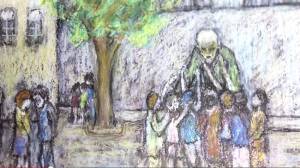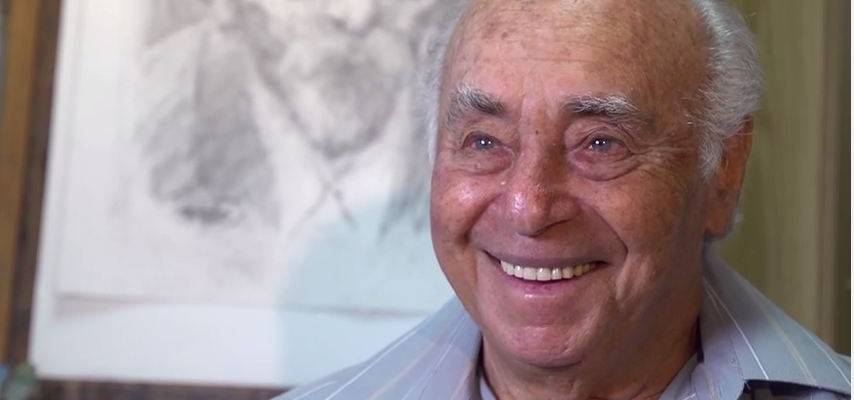
One of many drawings by artist Yitzchak Belfer based on his loving memories at the Korczak orphanage. (screenshot)
Itzchak Belfer, 89, shares his memories from the orphanage in pre-World War II Warsaw, where Dr. Yanusz Korczak treated children with dignity and total dedication.
Itzchak Belfer never really left Janusz Korczak’s orphanage on Krochmalna Street in Warsaw, Poland. Although he is now 90 years old and a well-known Israeli artist, Belfer will always be little Itzchakele from Warsaw, and Korczak is always with him in thought and spirit. The Polish Jewish doctor and educator lives on in Belfer’s drawings and paintings, and Yanusz Korczak’s spirit dwells in the artist’s soul.
Belfer shares with us his amazingly clear memories from the orphanage on Krochmalna Street in pre-World War II Warsaw. He reveals Korczak’s unique view of children as, first of all, human beings to be treated with the same dignity and consideration as adults. He warmly describes the work of Korczak and his assistant, Stepha Wilczyńska, demonstrating their love for the children and their total dedication to saving them, which led to their own tragic end.
(Source: Ministry of Foreign Affairs)
Janusz Korczak
(Pen name of Henryk Goldszmit; 1878/9-1942)
Polish Jewish doctor, author and educator. Born in Warsaw to an assimilated Jewish family, Korczak dedicated his life to caring for children, particularly orphans. He believed that children should always be listened to and respected, and this belief was reflected in his work. He wrote several books for and about children, and broadcast a children’s radio program. In 1912 Korczak became the director of a Jewish orphanage in Warsaw.
When World War II broke out in 1939, Korczak first refused to accept the German occupation and heed their regulations (consequently spending time in jail). However, when the Jews of Warsaw were forced to move into a ghetto, Korczak refocused his efforts on the children in his orphanage. Despite offers from Polish friends to hide him on the “Aryan” side of the city, Korczak refused to abandon the children.
On August 5, 1942, during a 2-month wave of deportations from the ghetto, the Nazis rounded up Korczak and his 200 children. They marched in rows to the Umschlagplatz with Korczak in the lead. He never abandoned his children, not even at the very end. Korczak and the children were sent to Treblinka, where they were all murdered.
Source: Yad Vashem










